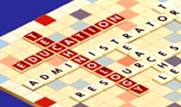
 |
| [ ASET ]
[ Proceedings Contents ] |
Jens Christenson, Ulf Lundin, Carlos Triay and Erno Lehtonen
European SchoolNet
Some background to the European SchoolNet
The European Schoolnet [EUN: http://www.eun.org/] exists to help develop learning opportunities for young people across Europe through communication and information exchange at all levels. Its activities are determined by the needs of the constituent members: 23 ministries of education, the European Commission, and ICT industry partners. It was established in March 1997 when the Ministers of Education of the European Union and the European Commission agreed to a proposal from Sweden. European Schoolnet was officially launched in September 1998 after the adoption of a formal EUN Agreement in Lisbon in June 1998. The decision-making body of European Schoolnet is its Steering Committee, which is composed of one representative from each of the participating ministries. The management of European Schoolnet is the responsibility of the EUN Office in Brussels with a truly European staff currently numbering some 30 people. Basic funding of European Schoolnet is provided by the Ministries of Education. In addition, the EUN manages and is involved in a number of projects supported by the European Commission within the framework of the education and R&D programmes of the European Union.The aims of the EUN are designed to meet the evolving needs of teachers and learners and to align with national and Commission forward plans. They are:
The work plan describes 18 tasks based on the above aims and objectives.
- To build a rich, multi-lingual European community for innovation and collaboration in educational policy and practice;
- To act as a seamless European gateway to national and regional education networks and their resources and services;
- To foster technical innovation, interoperability and common standards;
- To build a strong and effective EUN providing synergy and European added value in a networked world.
Highlights of recent months
In a constantly changing political, economic, technological and educational climate, EUN has continued to make headway. Among a number of successes, some particular achievements since November 2000 are:The panel will discuss the EU research programme on Technology Enhanced Learning. They will also explore Australian support for research and technological development. Further discussion will detail projects such as the Learning Project Cluster and the European Schoolnet. Finally discussion will focus on the advantages of international co-operation.
- Building up the trans-European network, providing value for national policy-makers and the European Commission. A number of events of high quality, particularly EMINENT in December 2000, helping policy innovation and bringing together education ministries within the cohesive framework of Insight. Insight is a policy and practice observatory providing up to date profiles of ICT in education in Europe and forums for information exchange.
- eSchola. A week of intense activity for collaboration and sharing excellence between schools in Europe, eSchola in May 2001 provided a short-term focus for accelerating long-term action and involved actively over 1,000 schools and new partners.
- Growing communities and cross-border collaborative activity, for example myEurope, the launch of the School ManagersŐ Centre and Comenius Space, and the highly-rated EUN TeachersŐ newsletter. The EUN is becoming the reference point for European collaboration between schools and provides a communication channel for learners, classroom teachers, school leaders, advisers and researchers.
- Fostering innovation in schools. The European Network of Innovative schools (ENIS) brings together over 500 of the leading edge schools in Europe. They act as test beds for new ideas and examples for other schools to visit and emulate.
- The growing content of the EUN portal and its improved functionality, notably multilinguality (most content and services in six languages) and being database-driven. In order to provide a better service it is being divided into two key areas: eSchoolnet for educational practitioners and the EUN for researchers, industry and policy-makers.
- Breaking new ground in technical innovation: impacting on the standards and interoperability debate, and creating and populating a Knowledge Management system.
- Success in projects receiving Commission funding, notably completion of the Multimedia project, MM1010, leading to lasting benefits, and early results from current projects, for example the European Treasury Browser and Dot.Safe.
- New project starts, for example OASIS, Valnet and eWatch, bringing in new players to international activities and enabling ministries and agencies to join partnerships for all-round value.
- Submitting proposals for new European projects like CELEBRATE presented to the 7th IST Call - a large-scale project bringing together leading pedagogical researchers, technology partners, publishers and other content providers with schools and broad band providers -and CHALLENGE - a Thematic Network proposal submitted to the 8th IST Call aimed at building a R&D roadmap for the schooling of tomorrow.
| Please cite as: Christenson, J., Lundin, U., Triay, C. and Lehtonen, E. (2002). The European experience with ICT in education: The European SchoolNet (EUN). In S. McNamara and E. Stacey (Eds), Untangling the Web: Establishing Learning Links. Proceedings ASET Conference 2002. Melbourne, 7-10 July. http://www.aset.org.au/confs/2002/christenson.html |